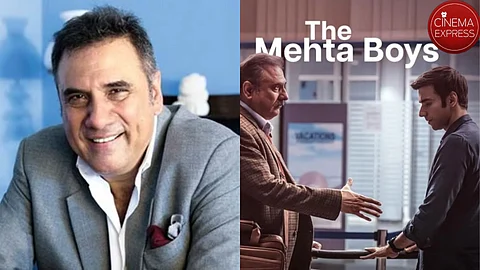

Boman Irani didn’t just jump into the arts. He was once a waiter at the prestigious Taj Mahal Palace Hotel, where he would also develop a penchant for photography and start covering boxing matches for the Indian Boxing Association. It wouldn’t be until he turned forty-three that he would finally break out as an actor, playing the hyperbolic, animated doctor in Rajkumar Hirani’s Munna Bhai MBBS (2003). More than two decades and a series of films later, he has ventured into writing, directing and producing with The Mehta Boys.
Boman, however, wanted to make a film ever since he was a kid. The turning point came when he was shooting for the late Shyam Benegal’s Well Done Abba (2009). Boman would discuss some of his ideas with Benegal. “Over breakfast, we would sit and talk about rewriting some scenes in a certain manner and discuss other aspects,” he says. On one of those days, Aparna Purohit (ex-Head of Originals, Prime Video), who was working on the film, came up to Boman and said that he should make a movie. “I told her that I am going to direct one day. She said, ‘Whenever you direct a film, I will come and work with you’”, Boman recalls. Later Aparna started working with Prime Video and called him one day. “She said, ‘Remember that story you told me when we were shooting Well Done Abba? Would you like to do it with us?’ I said it was meant to be with you,” says Boman.
The seed of that story which Boman had narrated to her came from filmmaker Sujoy Ghosh. It was about an estranged father and son who are forced to stay together for forty-eight hours. Boman instantly connected with the thought. “I liked the idea of someone spending forty-eight hours and then leaving,” he says. “But at the same time, I knew it just could not be a slice-of-life. There had to be something that's deeper which delves into someone’s flaws and exposes them.” While writing the film, Boman came back to this one quote about screenwriting which stayed with him. “It goes like, ‘You must tell the story which you are the most afraid to tell and most embarrassed to watch’”, says the actor-director. It leads to some surprising scenes in the film, breaking a sense of rhythm by unfolding in a manner that jolts you. For instance, a minor argument during a car ride on a rainy night between the father and son turns into an outburst as the former gets out and challenges his son for a fight. It is laced with humour as much as it is simmering with anger. Boman says that during table readings of the film, everyone told him the scene made them uncomfortable. “There are many scenes in the film that should make you uncomfortable because all of us are living with a certain anger and weakness. If it makes you sit back and reflect, then I have succeeded,” says Boman.
The actor's performance in The Mehta Boys isn’t far from what he has done in films like Ferrari Ki Sawari (2012) or even 3 Idiots (2009). Here, once again, he plays a character who has a mildly amusing, irritating, but still entertaining, demeanour. What is different here is the multiple roles he plays, both behind the camera and while facing it. In such a case, how did he remain objective about his performance? “Your insides tell you if you are doing it right or not. Besides, I have no problem asking my co-actors and assistants about it,” he says, adding that he had to think both as an actor and director to make the final call. “As a director, I know the rhythm of a scene and how it should be timed. The actor may not know this as he is only looking at himself as a character,” he says. Boman then adds lightheartedly, “So, every night, I would talk to the director and he is quite a reasonable guy."
The film’s highlight is the meticulous cinematography and production design which lends it a playful, sombre tone. Boman credits cinematographer Krish Makhija for working intricately with the visuals. “He made it aesthetic and still kept it real,” he says. The actor feels that a film is ultimately shaped by the efforts of so many hands. “We forget the contribution of our cinematographers, editors, and music composers. Without them, there’s no movie,” he says, ending the conversation on a cheeky, thoughtful note. “I mean, try making a film with just actors.”